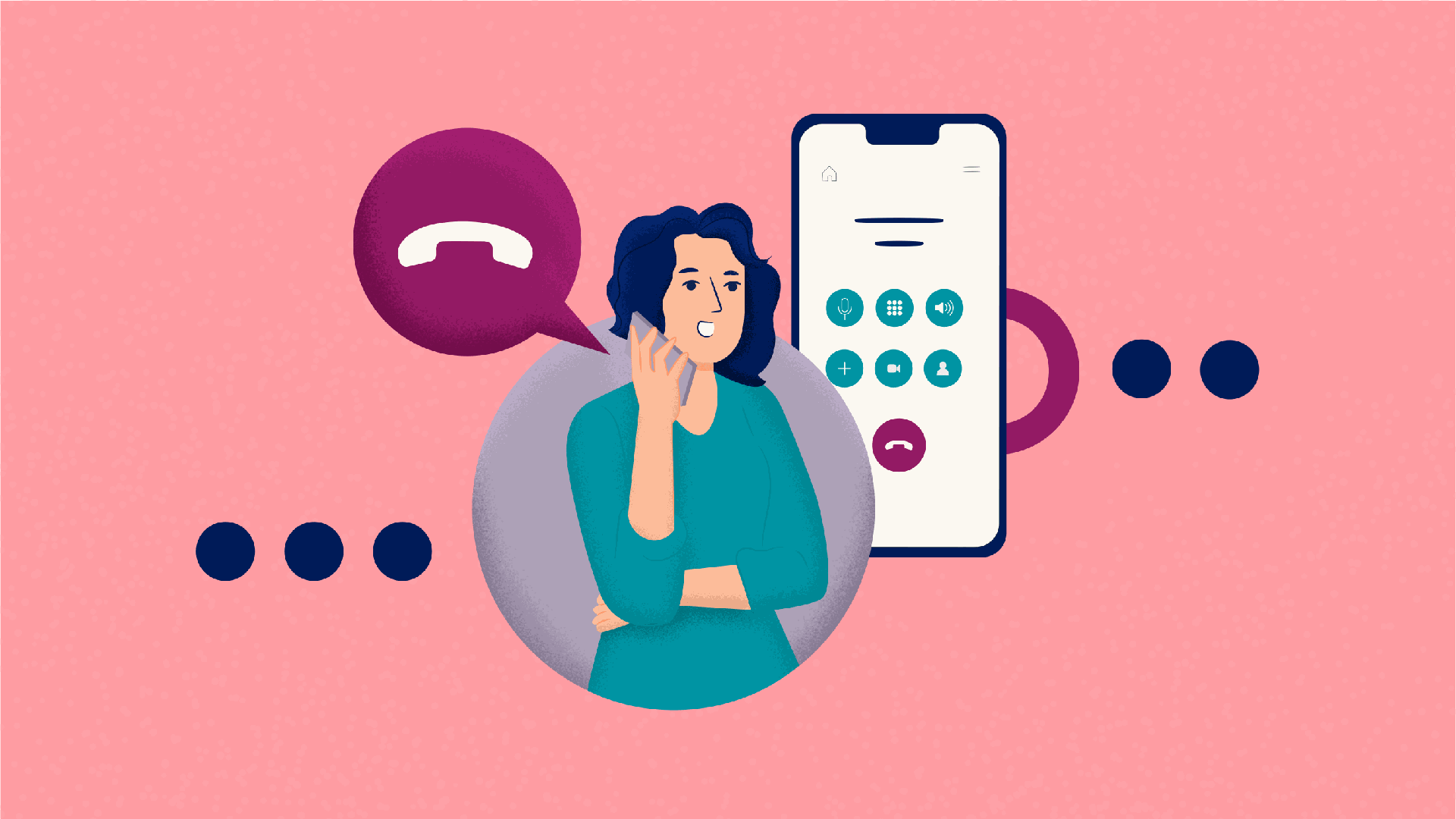
So you’re in the middle of phone call you don’t want to be having. Maybe it’s an unwanted call from a solicitor or a drawn-out call with a colleague, customer, or client. Or maybe it’s a call with someone you know and love, but it’s a difficult conversation or has just been going on for longer than you’d like. In any case, the exchange is eating up your time and energy, but you’re puzzling over how to hang up gracefully. How do you end this phone call?
Well, puzzler, puzzle no longer.
Here at Ruby, our virtual receptionists and chat specialists are experts in hellos and goodbyes. After all, we engage in hundreds of thousands of conversations for our customers every day. As much as we enjoy getting to know people and creating meaningful connections, we simply can’t keep every conversation going forever. In this article, we’ll share some of our tried-and-true tricks for ending calls the right way.
Table of contents
1. Make sure the business part of the phone call is complete without leaving things open-ended.
We’ve all been there: approaching the end of meeting or class when the teacher or meeting leader asks, “Does anyone have any more questions?” and someone inevitably raises their hand, and the conversation goes for another 20 minutes.
The same thing can happen with a phone call. Some people are happy to talk for extended periods of time, while others may be waiting for you to tell them when it’s over. The fact is that most of us have no idea how or when to stop talking or end a conversation. Don’t take my word for it—it’s science!
That means it may be up to you to take charge when it’s time to finish the conversation.
When you need to end a phone call, try not to end it by saying something like “Is there anything else I can help you with?” or “Did you have any other questions?” That person could very well have more questions—perhaps extensive, detailed questions you don’t have time for at the moment.
Wrap-up phrases to try
Instead of opening the floor for questions, try ending the call in a way that wraps things while leaving room for the other person to continue the conversation later.
For example:
“We’ve covered a lot today. Thank you so much for your time! Here is my email address, and you have my phone number if anything else comes up.”
This phrasing is polite and to the point, and closes the conversation while still giving the other person the opportunity to reach out later.
Here’s another approach to try:
“Thank you for speaking with me today! I don’t want to take more of your time. Here’s my contact information if you’d like to get in touch again.”
Find a closing phrase you are comfortable with that’s assertive, to the point, and unambiguous. Remember: you want to snip any dangling threads that could keep the conversation open.
Be sure to use a polite and uplifting tone. Although you may feel frustrated about how long the conversation has gone on, it isn’t productive to take that frustration out on the other person.
2. Know when to interrupt.
Although interrupting is usually a conversational faux pas, the occasional (professional) interruption can be necessary. As Patrick Byron writes in The Startup:
“[I]f someone is giving what you believe is incorrect information during a meeting, or even during a personal conversation, it may be time to jump in and redirect the conversation.
You certainly don’t want to sit silently if someone misrepresents something you’ve said.
There are times in public settings where it makes sense to interrupt others. If you are waiting in line but unsure if you are in the correct line it makes sense to break in and ask someone for correct information. Better to do that than stand in the wrong line for too long.
It’s time to tactically interrupt someone when it would be a disservice to your interests not to, and when you can do it with a minimum of damage to your reputation. In other words, when the benefits outweigh the negatives.”
One instance when the benefits may outweigh the negatives is when you need to end a conversation. Let’s say you’re busy, you have a hard stop at a certain time, or an emergency suddenly comes up and you have no choice but to attend to it. In those cases, it’s okay to speak up.
Examples of polite interruptions
Here are a few polite, tactful interruptions to try:
Interruptions vs. interjections
Keep in mind that there’s a difference between an interruption and an interjection. Interruptions stop the flow of conversations, while interjections tend to keep things moving in their current direction. That means, if you want to end a phone call, you may want to limit your use of interjections.
Contrast the following and think about how it feels to say and hear an interruption versus an interjection:
Interruptions
“Excuse me.”
“Sorry, can we pause for a moment?”
“I hate to interrupt, but…”
“I’d like to return to something you just said.”
“May I add something here?”
Interjections
“Oh, wow!”
“Really?”
“Uh-huh…”
“That’s amazing.”
“Oh no, that’s terrible!”
3. Take advantage of pauses in the conversation.
Sometimes, interrupting isn’t possible or advisable. (I wouldn’t recommend interrupting your mother-in-law to cancel dinner plans, for instance.) Instead, your best bet is to take advantage of natural pauses or breaks in the conversation.
These typically occur after…
- One person has answered the other person’s question(s)
- A problem is resolved
- Someone accepts or rejects an offer
- Someone offers an explanation or apology
- Someone has changed their mind or is reconsidering something
Any of these pauses can be an ideal time to step in with a phrase that signals the conversation is over or wrapping up.
Phrases for ending a call after a natural pause
Some phrases you can use to end a call include:
(*Best used in very specific circumstances.)
Effective conversation closers often include an expression of gratitude (“thank you for your time”) as well as a brief recap of the conversation (“I appreciate you sharing this concern with me”) and a glimpse at follow-up action items (“let’s talk about next steps”).
Keep in mind that there’s nothing wrong with having to end a call. In many cases, it’s the kind thing to do—the other person is probably eager to get on with their day as well. As long as you remain polite, professional, and empathetic to the other person’s needs, you’ll come away from the conversation having made a connection.
When thinking of ending a phone call, be sure to give yourself enough time to organize your notes about the conversation. This will help you follow up on any commitments you promised during the call and remember important details about the other person.
Speaking of the future…
4. Leave the door open for future communication.
Many conversations don’t end when a phone call ends. If you intend to follow up, spell out how and when.
For example:
Ultimately, the key to ending a conversation well is to focus on the other person: What do they need? If you can fulfill that need while the call is happening, do so and wrap things up. If you can’t fulfill their need during the call, tell them what you plan on doing and when they can expect next steps (if you know or can confidently estimate that information), so they have some relief while they wait.
Make sure to balance your needs with the other person’s. Think: Do you need to get off the call, or would you just prefer to? Are they talking at length because they enjoy it or because they don’t feel totally heard? Do they realize they’re dragging the call on? Whatever the reason may be, have empathy for the person on the other line while maintaining your own boundaries. Respect their time and humanity as well as your own.

One more thing before I let you go…
As much as you’d might like to avoid talking on the phone at length—if at all—calls can be valuable opportunities to connect. A bit of small talk here and there sows the seeds for meaningful connections and lasting relationships with the people you serve.
That said, you don’t have to do it yourself. If you’d rather minimize distractions, can’t take every call, or don’t have the time to spend as long on the phone as you’d like, Ruby’s here to help.
Our highly trained virtual receptionists and live chat specialists create connections with your callers and website visitors on your behalf—full-time, part-time, as backup, or whenever you need us. Learn more.
Visit Ruby’s small business hub for more ways to connect with the people you serve in your business.



